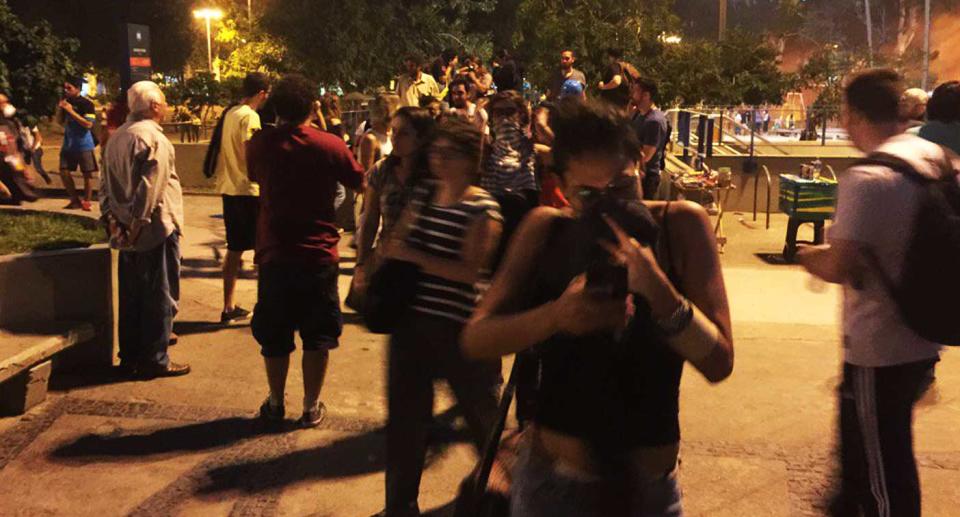Severe strain from Summer Games starting to show on people of Rio de Janeiro

RIO DE JANEIRO — A mother lifted up her child and raced across the playground they were on — not in any one direction, just away from danger.
Moments later, a cloud emerged in the dusk followed by a sharp smell. Tear gas. People coughed and covered their faces. A medical crew helped whomever it could find.
A Friday afternoon at a park — something families around the world should enjoy — was ruined when a protest against these Summer Olympics spiraled into conflict.
There is plenty of blame to go around for what took place near Maracana Stadium on the night of the Opening Ceremony. Blame the police for unleashing tear gas next to a playground. Blame the protesters for grabbing a Brazil flag from that same playground and burning it. Blame the government for being corrupt, or demonstrators for seeking attention, or media for showing it to the world.
But Friday’s events show the strain that the Games have placed on this city, and that strain won’t dissipate like so much tear gas.
It’s not that the Olympics are evil. In fact, the protest march proceeded right past a gymnastics school in North Rio – a reminder of the worldwide dreams inspired by what we’ll all be watching this month. The issue is that the Olympics always seem to make a host city’s problems worse. This is especially the case here.
The local police are behind on pay. The people living in favelas that were supposed to be uplifted by police “pacification” programs over the past decade of hosting major sporting events are now living in increasing fear of oppressive authorities. The bus routes that were supposed to make living easier for everyone have benefited few, and mostly the wealthier few. And people have been displaced from their homes to make way for Olympic venues.
[Related: Fear and death in the favelas: How the Olympics affect Rio’s lower class]
“All of these things are supposed to be Olympic legacies,” said Stephanie Reist, a Chicagoan who is here working on her dissertation and was among the protesters on Friday. “They have all been points of contention for people who are living in Rio.”
Put simply: The Summer Games have been a burden here in ways they should have been a gift. Whether it’s something as frustrating as creating traffic problems by adding an Olympics lane on the highway, or something as troubling as the building of a bike path that crashed into the sea, or something as scary as the spike in police killings over the last few years, it feels like the goal of world welcoming has left out the host city.
“The Olympics was sold as this thing that was supposed to include people and modernize the city,” Reist said, “and it’s just been used to exclude.”
So although the demonstrators are hardly blameless, especially considering some of them entered a store Friday and turned over some tables, any demand for them to stop is just asking for more silence and exclusion. And although the police have been callous and brutish – maybe next time use a bullhorn to warn people that they’re about to get tear-gassed – it’s a lot to ask of any force to protect an international event in a major city from both the outside and the inside.
The officers did not look gleeful or angry as they acted on Friday. They looked exhausted.
Then there are the bystanders, like the families out for a day at the park. Or the shopkeepers who had to close early out of fear of loitering and vandalism. “This is not the moment for this,” said one store owner from behind a lowered gate. These are the local businesses that should have benefited from an influx of tourists.
Instead, many in the Olympics community are staying miles away, in Barra, which is a commute made even longer by the traffic. Some of the small business owners are worried that income will dwindle this month, rather than flow more quickly.
The damage from the protests was limited, mercifully. Demonstrators and police had dispersed well before the start of the Opening Ceremony. Then the world tuned in and saw athletes smiling and dignitaries feeling proud. It was a gorgeous event, showing off the best of a fascinating nation.
But for many who live here, the lasting memory won’t be of what they saw on television. It will be of what happened over the last several years in their lives and in their neighborhoods, and what didn’t.


